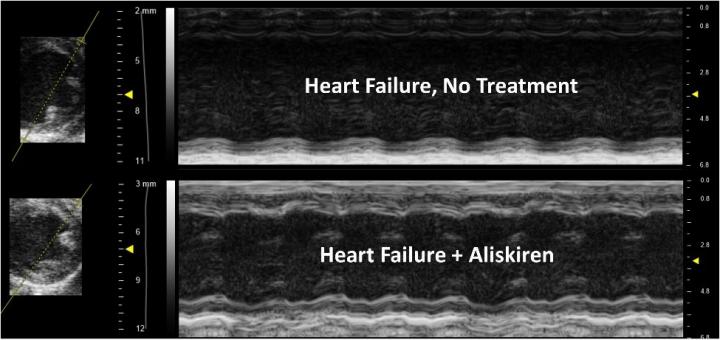
Credit: UA College of Medicine — Phoenix
PHOENIX – Researchers at the University of Arizona College of Medicine – Phoenix have shown for the first time in preclinical studies that Aliskiren, a drug that inhibits the enzyme that regulates blood pressure, can delay the progression of congestive heart failure and lengthen survival rates.
More than 5 million Americans live with congestive heart failure, a chronic progressive condition that occurs when the heart muscle doesn’t pump blood as well as it should.
“This FDA-approved drug has the potential to improve the quality and extend the life in properly identified heart failure patients,” said Ryan Sullivan, DVM, assistant professor in the college’s Department of Internal Medicine and lead author of the study, “Normalizing Plasma Renin Activity in Experimental Dilated Cardiomyopathy: Effects on Edema, Cachexia, and Survival,” published in the August 2019 edition of the International Journal of Molecular Sciences, as part of a Special Issue Heart Failure: From Molecular Basis to Therapy.
“That’s an extra 5.6 years with loved ones that otherwise would not be possible. Obviously, further studies are needed, along with human clinical trials, but we are excited about our research direction and what those outcomes could mean for the college and the people of Arizona and beyond.”
The Cardiovascular Disease Research group from the UA College of Medicine – Phoenix Department of Internal Medicine used a new technology to evaluate changes in muscle mass and fluid retention over time in heart failure. Using this noninvasive technology, they showed that Aliskiren blocked muscle loss, prevented fluid retention and saved lives.
“Heart failure is a rapidly increasing cause of disability and death,” Dr. Sullivan said. “Patients suffer from progressive muscle wasting and fluid retention, which leads to discomfort, shortness of breath and fatigue. There is a need to better measure muscle wasting and fluid retention to identify effective methods for treatment and prevention. These exciting findings demonstrate new approaches that may guide future care for heart failure patients.”
Edema and muscle wasting occur during the progression of heart failure and neither is always clinically evident.
One of the major challenges in heart failure management is detecting and reproducibly quantifying edema and muscle mass over time in response to interventions that treat breathlessness, clinical symptoms of heart failure and cardiac cachexia, which is unintentional severe weight loss associated with heart failure.
The team identified and implemented the technology known as QMR (quantitative magnetic resonance) as a method to objectively measure edema development longitudinally throughout the disease progression. In addition, the device captures changes in body fat and lean muscle mass, which are associated with poor prognosis in heart failure patients.
This technology has potential applications in monitoring and adjusting individual treatment protocols by using a precision medicine approach for clinical heart failure patients.
###
Research funding was supported by NIH grants: NS089707 (Guy L. Reed) and HL115036 (Inna P. Gladysheva). Patents related to this study have been filed by the authors, along with UA Tech Launch Arizona.
DOI:10.3390/ijms20163886
https:/
About the UA College of Medicine – Phoenix
Founded in 2007, the University of Arizona College of Medicine – Phoenix inspires and trains exemplary physicians, scientists and leaders to optimize health and health care in Arizona and beyond. By cultivating collaborative research locally and globally, the college accelerates discovery in a number of critical areas — including cancer, stroke, traumatic brain injury and cardiovascular disease. Championed as a student-centric campus, the college has graduated 500 physicians, all of whom received exceptional training from nine clinical partners and 1,800 diverse faculty members. As the anchor to the Phoenix Biomedical Campus, which is projected to have an economic impact of $3.1 billion by 2025, the college prides itself on engaging with the community, fostering education, inclusion, access and advocacy. For more information, please visit phoenixmed.arizona.edu.
About the University of Arizona Health Sciences
The University of Arizona Health Sciences is the statewide leader in biomedical research and health professions training. The UA Health Sciences includes the UA Colleges of Medicine (Tucson and Phoenix), Nursing, Pharmacy, and the Mel and Enid Zuckerman College of Public Health, with main campus locations in Tucson and the growing Phoenix Biomedical Campus in downtown Phoenix. From these vantage points, the UA Health Sciences reaches across the state of Arizona and the greater Southwest to provide cutting-edge health education, research, patient care and community outreach services. A major economic engine, the UA Health Sciences employs nearly 5,000 people, has approximately 900 faculty members and garners $200 million in research grants and contracts annually. For more information: uahs.arizona.edu
Media Contact
Teresa Joseph
[email protected]
602-827-2657
Original Source
https:/
Related Journal Article
http://dx.




